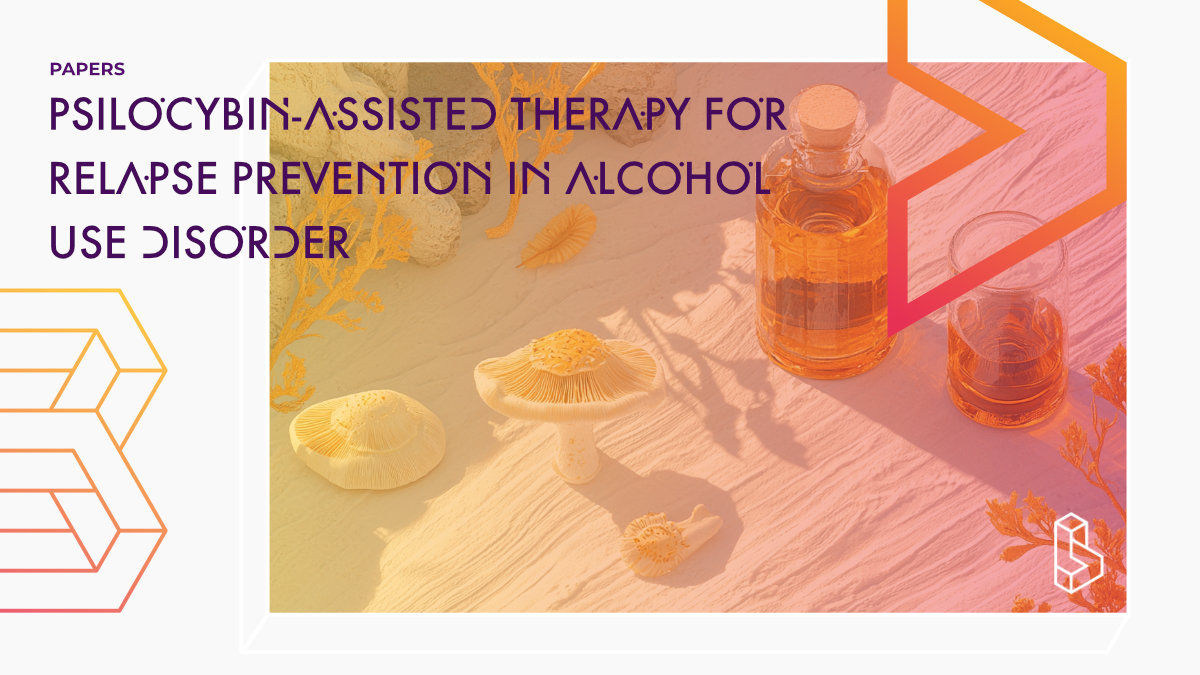This double-blind randomised clinical trial (n=37) found that a single dose of psilocybin (25mg) with brief psychotherapy did not significantly reduce alcohol relapse rates or consumption compared to placebo in patients with alcohol use disorder (AUD) at 4-week or 6-month follow-up, though psilocybin participants reported additional reductions in craving and temptation to drink, suggesting larger trials are needed to evaluate this approach for severely affected patients.
Abstract of Psilocybin-assisted therapy for relapse prevention in alcohol use disorder
“Background Despite the promising therapeutic effects of psilocybin, its efficacy in preventing relapse after withdrawal treatment for alcohol use disorder (AUD) remains unknown. This study aims to assess whether a single dose of psilocybin combined with brief psychotherapy could reduce relapse rates and alcohol use in AUD patients.
Methods This single-center, double-blind, randomized clinical trial was conducted in Switzerland. We recruited participants with AUD between June 8, 2020, and August 16, 2023 who completed withdrawal treatment within six weeks prior to enrollment. Participants were randomized (1:1) to receive either a single oral dose of psilocybin (25 mg) or placebo (mannitol), combined with brief psychotherapy. The primary outcomes were abstinence and mean alcohol use at 4-week follow-up. Participants completed the timeline followback to assess daily alcohol use.
Findings We included 37 participants who completed the 4-week follow-up (female:male = 14:23; psilocybin = 18, placebo = 19) in the analysis. There were no significant differences between groups in abstinence duration (p = 0.55, psilocybin mean = 16.80 days, 95% CI: 14.31–19.29; placebo mean = 13.80 days, 95% CI: 10.97–16.63; Cohen’s d = 0.151) or mean alcohol use per day (p = 0.51, psilocybin: median = 0.48 standard alcohol units, range: 0–3.99, placebo: median = 0.54 standard alcohol units, range: 0–5.96; Cohen’s d = 0.11) at 4-week or 6-month follow-up (abstinence: Cohen’s d = 0.10, alcohol use: Cohen’s d = 0.075). Participants in both groups reported reduced craving and temptation to drink alcohol after the dosing visit, with an additional reduction observed in the psilocybin group. Thirteen adverse events occurred in the psilocybin and seven in the placebo group. One serious adverse event occurred in the psilocybin and four in the placebo group, all related to inpatient withdrawal treatments.
Interpretation A single dose of psilocybin combined with five psychotherapy sessions may not be sufficient to reduce relapse rates and alcohol use in severely affected AUD patients following withdrawal treatment. However, given the limited sample size of our study, larger trials are needed in the future to confirm these findings.“
Authors: Nathalie M. Rieser, Raoul Bitar, Simon Halm, Christina Rossgoderer, Ladina P. Gubser, Maeva Thévenaz, Yara Kreis, Robin von Rotz, Carlos Nordt, Monika Visentini, Flora Moujaes, Etna J.E. Engeli, Andres Ort, Erich Seifritz, Franz X. Vollenweider, Marcus Herdener & Katrin H. Preller
Summary of Psilocybin-assisted therapy for relapse prevention in alcohol use disorder
The harmful use of alcohol represents one of the leading global health risks, with Alcohol Use Disorder (AUD) characterised by recurring cycles of treatment, periods of abstinence, and relapse. Relapse, defined as the re-initiation of alcohol use following abstinence (specifically more than one standard alcohol unit per day), becomes more challenging with each cycle, often accompanied by more severe withdrawal symptoms and increased psychiatric complications.
While current medications like naltrexone and acamprosate are available for treating AUD, relapse rates remain stubbornly high, with at least 60% of patients relapsing within six months after treatment. This high relapse rate underscores a critical need for more effective treatments, particularly for preventing relapse after withdrawal. Psychedelics, including psilocybin, are psychoactive compounds that induce alterations in perception, consciousness, cognition, and mood. Research from the 1950s and 1960s explored their potential in treating AUD, showing promising efficacy and safety profiles.
Recent research has demonstrated that psilocybin, when combined with cognitive behavioural therapy and motivational enhancement therapy, can reduce heavy drinking days in patients aiming to reduce their alcohol use. However, no randomised controlled trials conducted to current standards have investigated whether psilocybin can prevent relapse in AUD patients who have undergone withdrawal treatment. While recent studies in depression have shown comparable efficacy with one or two doses, the efficacy of a single dose of psilocybin has not been tested in AUD. This study aims to assess whether a single dose of psilocybin combined with brief psychotherapy could effectively prevent relapse after withdrawal treatment.
Methods
Study Design and Ethics
Find this paper
https://doi.org/10.1016/j.eclinm.2025.103149
Open Access | Google Scholar | Backup | 🕊
Cite this paper (APA)
Rieser, N. M., Bitar, R., Halm, S., Rossgoderer, C., Gubser, L. P., Thévenaz, M., ... & Preller, K. H. (2025). Psilocybin-assisted therapy for relapse prevention in alcohol use disorder: a phase 2 randomized clinical trial. EClinicalMedicine, 82.
Study details
Compounds studied
Psilocybin
Placebo
Topics studied
Addiction
Alcohol Use Disorder
Study characteristics
Original
Placebo-Controlled
Double-Blind
Randomized
Participants
37
Humans
Institutes
Institutes associated with this publication
University of ZurichWithin the Department of Psychiatry, Psychotherapy and Psychosomatics at the University of Zurich, Dr Mialn Scheidegger is leading team conducting psychedelic research and therapy development.
Linked Clinical Trial
Clinical and Mechanistic Effects of Psilocybin in Alcohol Addicted PatientsThis Phase II (n=60) investigated if psilocybin (single-dose, 25mg), in combination with a withdrawal treatment (taking place in the 6 weeks before psilocybin administration), would have beneficial effects over the treatment alone.

